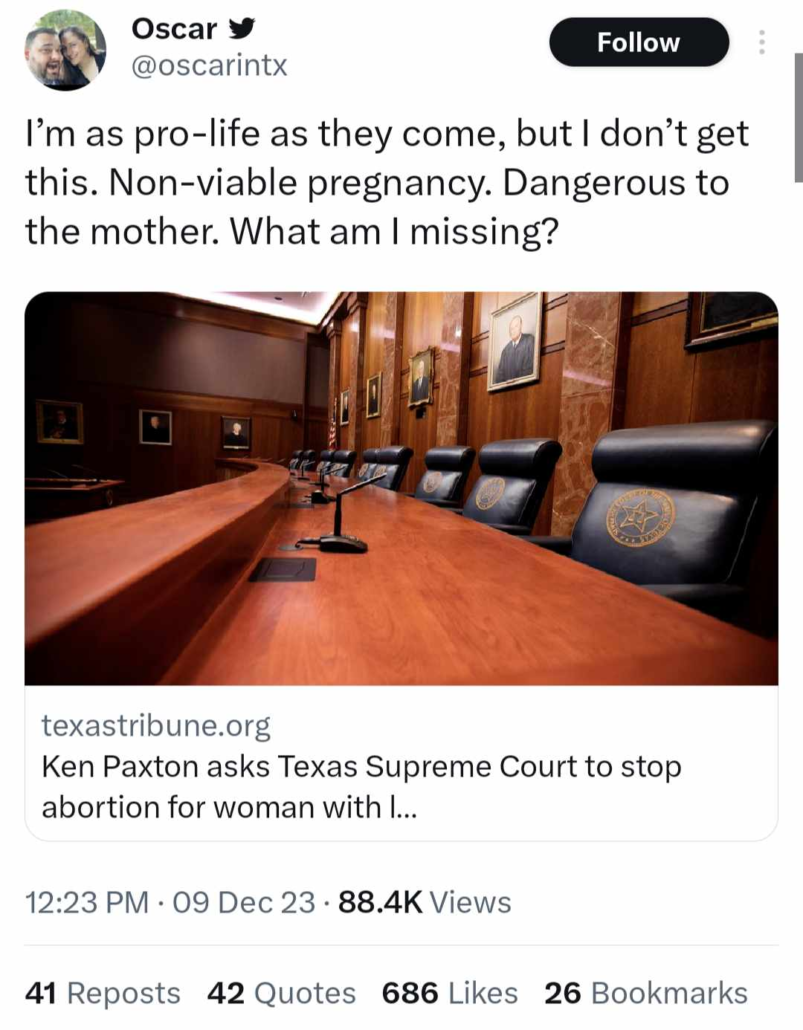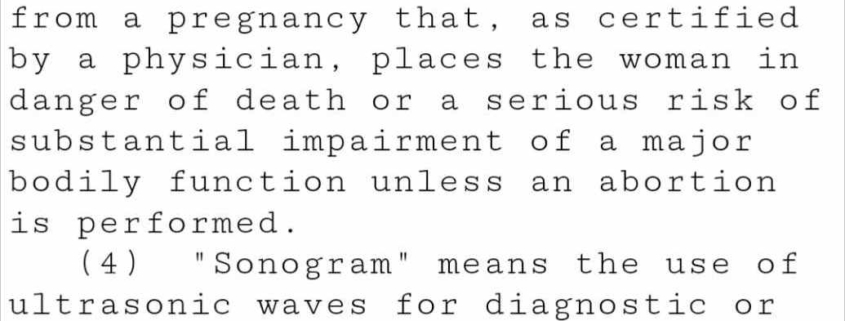Kate Cox, Trisomy 18, and the Texas abortion law
I’ve seen quite a few people asking about the Kate Cox case. This tweet in particular caught my eye:

Summary of Kate Cox case
If you don’t already know, Kate Cox is a woman a little over 20 weeks pregnant with a little girl with Trisomy 18.
Trisomy 18, also known as Edward’s Syndrome, is typically fatal. About 70% of children with it die in utero, and of the children born alive, only about 10% make it past the first year. (Note there is an argument that percentage could be higher if such children were given the same medical care, such as heart treatments, that children the same age without Trisomy 18 typically receive.)
Kate Cox has had two previous c-sections, and her doctor has asserted that going through with this pregnancy would be dangerous and could include the risk of uterine rupture or hysterectomy.
It’s important to understand that this isn’t just a situation of having certain risks related to pregnancy and not wanting to undergo them if you don’t think the child will survive. This is about the risks of pregnancy increasing because the child is not likely to survive. Children with Trisomy 18 are far more likely to die in utero, which is associated with stillbirths. And women who experience stillbirths are significantly more likely to experience severe maternal morbidity than women who experience live births.
Morbidity is not mortality (mortality is death, morbidity is health complications). Still, it indicates that when you have a greater risk of intrauterine fetal death, you have a greater risk of maternal health complications.
In any case, Kate Cox sued Texas to be able to get this abortion, and a district court issued a restraining order against the Texas abortion and said “Yes, she can get this abortion,” and then Attorney General Ken Paxton said “No, she can’t” and asked the Texas Supreme Court to intervene. The Texas Supreme Court halted the district court’s restraining order while they reviewed the situation. Since then attorneys for Kate Cox have said she is leaving Texas to obtain the abortion in another state.
Different views of abortion for fetal anomalies
There are a number of ways pro-choice and pro-life viewpoints diverge regarding abortion for fetal anomaly. (The following are generalizations, and there will be variety on either side.)
- Pro-choicers generally don’t view fetuses as people or children, but as potential people. Pro-lifers view fetuses as people and children right now.
- Pro-choicers generally view abortion for fetal anomaly as a kind of euthanasia and a mercy to prevent future suffering. Pro-lifers view it as choosing to kill children because they have certain disabilities.
- Pro-choicers are more likely to make quality of life arguments for abortion. That’s where you hear people say “What if the child will have a disability? What if she’ll end up in foster care? What if she’ll be unloved by her mother?” Pro-lifers tend to view these arguments with deep suspicion and skepticism. Many of us have had many difficult circumstances, and it doesn’t mean that we wish we never existed.
- I think pro-lifers are also more likely to read and share stories about false positive diagnoses for all kinds of prenatal conditions, as well as stories about members of the medical community pressuring mothers who receive prenatal diagnoses to abort.
- (Added 12/15/23) Pro-lifers are more likely to believe fetuses can feel pain at stages when most abortions for fetal anomaly take place. Pro-choicers are more likely to believe fetuses feel pain later in pregnancy, or not during pregnancy at all.
To be clear, there are many pro-life people who think there should be exceptions in abortion laws for fatal fetal anomalies, and there are a lot of pro-life people who vehemently do not. I’m not trying to resolve those differences here. I just want to shed some light on the different perspectives on fetal anomalies in general.
Application of Texas abortion law
The Texas abortion law does have exceptions for medical emergencies, which it defines as follows:
“Medical emergency” means a life-threatening physical condition aggravated by, caused by, or arising from a pregnancy that, as certified by a physician, places the woman in danger of death or a serious risk of substantial impairment of a major bodily function unless an abortion is performed.
Texas Health and Safety Code 171.002(3)
Recall that Cox’s doctor has asserted that she is at greater risk of uterine rupture or hysterectomy, which sounds like “serious risk of substantial impairment of a major bodily function.” Clearly the Texas AG disagrees, and in fact he sent a letter to the hospitals where Cox’s doctor has admitting privileges and warned them that the temporary restraining order from the district court will expire long before the statute of limitations for violating Texas abortion law does.
I expect the general concern from the pro-life side is that the pro-choice side is going to try to broaden the exceptions to abortion bans to the point where they will apply for elective abortion and not just medical emergencies. I’ve seen a lot of suspicion about whether or not a child with Trisomy 18 has any significant impact on the risks of health to the mother. There are definitely people on the pro-life side who are suspicious that Kate Cox is not at greater risk compared to if she had a child with no abnormalities, but that her advocates are trying to use a heart wrenching case to broaden loopholes to the abortion bans. And maybe the Texas AG is trying to make sure that doesn’t happen.
I hesitate over that response, though. Texas abortion law is supposed to be that if a physician asserts that a woman has substantial risk of major bodily impairment or of death, then they can perform that abortion and it is not illegal in Texas.
I get that pro-lifers are suspicious of whether abortion providers will act in good faith based on the spirit of these exceptions. But it’s completely unworkable and impractical to expect doctors to have the time and space to clear their different emergency cases with the Texas Attorney General’s office.
If we’re going to try to craft abortion bans or abortion restrictions with exceptions for genuine medical emergencies, and if those exceptions are supposed to be based on a physician’s reasonable medical judgement, then those exceptions have to play out in a way where physicians can trust what they consider their reasonable medical judgement in the middle of emergencies or in advance of pending emergencies without waiting for their decisions to be bounced around different courts trying to determine if their situation qualifies as an exception to the law.
I say all this as someone who is passionately pro-life. I’m very anti-abortion. I want to see elective abortion outlawed in our country.
But I want to do it in a way that women who are facing genuine medical emergencies can still get life-saving care.
I’m not alone in that perspective. That’s the perspective of basically every pro-lifer I have ever talked to or worked with.
So if there’s more information about the Kate Cox case that I have missed, or misunderstood, I’m open to hearing it. But the way it has played out so far has left me pretty concerned.
TikTok form
December 12, 2023 update: Texas Supreme Court ruling
The Texas Supreme Court issued a ruling. SCOTX said:
- Texas’s medical emergency exception requires physicians to assert, based on reasonable medical judgment, that an abortion is necessary to preserve the life or prevent the major bodily impairment of the pregnant woman.
- Kate Cox’s physician asserted the abortion was necessary based on a good faith standard.
- These are legally different standards, with the good faith standard being the broader, less strict one.
- The district court erred in applying the less strict standard instead of requiring reasonable medical judgment, and therefore erred in issuing a restraining order against the Texas abortion law.
- Kate Cox’s physician can still perform a medical emergency abortion if the physician believes, based on reasonable medical judgment, that such an action is necessary.
- However, the district court can’t preemptively protect the physician from liability based only on a good faith standard, rather than a reasonable medical judgment standard.



